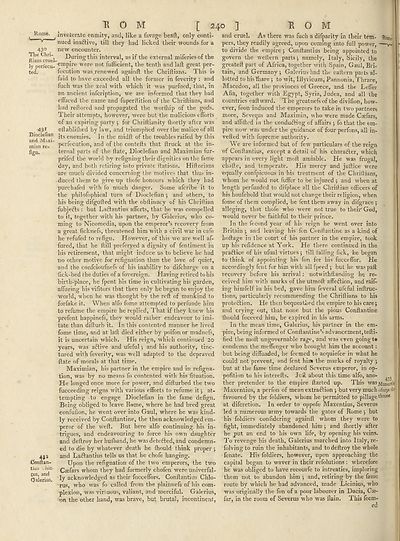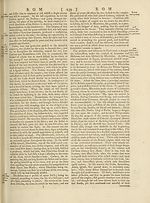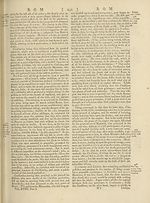Encyclopaedia Britannica, or, a Dictionary of arts, sciences, and miscellaneous literature : enlarged and improved. Illustrated with nearly six hundred engravings > Volume 18, RHI-SCR
(248) Page 240
Download files
Complete book:
Individual page:
Thumbnail gallery: Grid view | List view

Rome.
430
The Chri-
itians cruel-
ly perfecu-
ted.
. 431
Diocletian
and
mian re-
fign.
Conftan-
tius .hio
i;us, and
Oalerius.
It O M [ 240 ] ROM
inveterate enmity, and, like a favage bead:, only conti¬
nued inaftive, till they had licked their wounds for a
new encounter.
During this interval, as if the external miferiesof the
empire were not fufficient, the tenth and lad great per¬
fection was renewed againd the Chridians. This is
faid to have exceeded all the former in feverity : and
fuch was the zeal with which it was purfued, that, in
an ancient infeription, we are informed that they had
effaced the name and fuperdition of the Chridians, and
had redored and propagated the wordiip of the gods.
Their attempts, however, were but the malicious efforts
of an expiring party j for Chridianity diortly after was
edablidied by law, and triumphed over the malice of all
its enemies. In the midd of the troubles raifed by this
perfecution, and of the conteds that druck at the in¬
ternal parts of the date, Dioclefian and Maximian fur-
prifed the world by redgning their dignities on the fame
day, and both retiring into private datioiis. Hidorians
are much divided concerning the motives that thus in¬
duced them to give up thofe honours which they had
purchafed with fo much danger. Some aferibe it to
the philofophical turn of Dioclefian •, and others, to
his being difguded with the obdinacy of his Chridian
fubje£ts : but X.a6Iantius afferts, that he was compelled
to it, together with his partner, by Galerius, who co¬
ming to Nicomedia, upon the emperor’s recovery from
a great ficknefs, threatened him with a civil war in cafe
he refufed to refign. However, of this we are well af-
fured, that he dill preferyed a dignity of fentiment in
his retirement, that might induce us to believe he had
no other motive for refignation than the love of quiet,
and the confcioufnefs of his inability to difeharge on a
dek-bed the duties of a fovereign. Having retired to his
birth-place, he fpent his time in cultivating his garden,
affuring his vifitors that then only he began to enjoy the
world, when he was thought by the red of mankind to
forfake it. When alfo fome attempted to perfuade him
to refume the empire he replied, That if they knew his
prefent happinefs, they would rather endeavour to imi¬
tate than didurb it. In this contented manner he lived
fome time, and at lad died either by poifon or madnefs,
it is uncertain which. His reign, which continued 20
years, was aftive and ufeful; and his authority, tinc¬
tured with feverity, was well adapted to the depraved
date of morals at that time.
Maximian, his partner in the empire and in refigna¬
tion, was by no means fo contented with his fituation.
He longed once more for power, and didurbed the two
fucceeding reigns with various efforts to refume it; at¬
tempting to engage Dioclefian in the fame defign.
Being obliged to leave Rome, where he had bred great
confufion, he went over into Gaul, where he was kind¬
ly received by Condantine, the then acknowledged em¬
peror of the wed. But here alfo continuing his in¬
trigues, and endeavouring to force his own daughter
and dedroy her hufband, he was detefted, and condemn¬
ed to die by whatever death he fhould think proper ;
and La&antius tells us that he chofe hanging.
Upon the refignation of the two emperors, the trvo
Ceefars whom they had formerly chofen were univerfal-
ly acknowledged as their fucceffors. Condantius Chlo-
rus, who was fo called from the plainnefs of his com¬
plexion, was virtuous, valiant, and merciful. Galerius,
on the other hand, was brave, but brutal, incontinent,
and cruel. As there was fuch a difparity in their tem- Rome
pers, they readily agreed, upon coming into full power, —^
to divide the empire •, Condantius being appointed to
govern the wedern parts j namely, Italy, Sicily, the
greated part of Africa, together with Spain, Gaul, Bri¬
tain, and Germany •, Galerius had the eadern parts al¬
lotted to his lliare ; to wit, IHyi icum, Pannonia, Thrace,
Macedon, all the provinces of Greece, and the Leffer
Afia, together with Egypt, Syria, Judea, and all the
countries eadward. The greatnefs of the divifion, how¬
ever, foon induced the emperors to take in two partners
more, Seve^us and Maximin, who were made Caefars,
and affided in the conducing of affairs ; fo that the em¬
pire now was under the guidance of four perfons, all in-
veded w'ith fupreme authority.
We are informed but of few particulars of the reign
of Confiantius, except a detail of his character, which
appears in every light mod amiable. He was frugal,
chade, and temperate. His mercy and judice were
equally confpicuous in his treatment of the Chridians,
whom he would not fuffer to be injured ; and when at
length perfuaded to difplace all the Chridian officers of
his houfehold that would not change their religion, when
fome of them complied, he fentthem away in difgrace ;
alleging, that thofe who were not true to their God,
would never be faithful to their prince.
In the fecond year of his reign he went over into
Britain j and leaving his fon Condantine as a kind of
hodage in the court of his partner in the empire, took
up his refidence at York. He there continued in the
practice of his ufual virtues; till falling fick, he began
to think of appointing his fon for his fucceffor. He
accordingly fent for him wdlh all fpeed ; but he was pad
recovery before his arrival: notwithdanding he re¬
ceived him with marks of the utmod affeftion, and raif-
ing himfelf in his bed, gave him feveral ufeful indruc-
tions, particularly recommending the Chridians to his
proteflion. He then bequeathed the empire to his care;
and crying out, that none but the pious Condantine
fhould fucceed him, he expired in his arms.
In the mean time, Galerius, his partner in the em¬
pire, being informed of Condantine’s advancement,tedi-
fied the mod ungovernable rage, and was even going t*
condemn the meffenger who brought him the account:
but being diffuaded, he feemed to acquiefce in what he
could not prevent, and fent him the marks of royalty ;
but at the fame time declared Severus emperor, in op-
pofition to his intereds. Juft about this time alfo, ano¬
ther pretender to the empire darted up. This
Maxentius, a perfon of mean extraftion ; but very much ufurpsth
favoured by the foldiers, whom he permitted to pillage throne
at diferetion. In order to oppofe Maxentius, Severus
led a numerous army towards the gates of Rome; but
his foldiers confidering againd whom they were to
fight, immediately abandoned him ; and fhortly after
he put an end to his own life, by opening his veins.
To revenge his death, Galerius marched into Italy, re¬
viving to ruin the inhabitants, and to dedroy the whole
fenate. His foldiers, however, upon approaching the
capital began to waver in their refolutions: wherefore
he was obliged to have recourfe to intreaties, imploring
them not to abandon him ; and, retiring by the fame
route by which he had advanced, made Licinius, who
was originally the fon of a poor labourer in Dacia, Cae-
far, in the room of Severus who was flain. This feem¬
ed
433,1
was Maxentia
430
The Chri-
itians cruel-
ly perfecu-
ted.
. 431
Diocletian
and
mian re-
fign.
Conftan-
tius .hio
i;us, and
Oalerius.
It O M [ 240 ] ROM
inveterate enmity, and, like a favage bead:, only conti¬
nued inaftive, till they had licked their wounds for a
new encounter.
During this interval, as if the external miferiesof the
empire were not fufficient, the tenth and lad great per¬
fection was renewed againd the Chridians. This is
faid to have exceeded all the former in feverity : and
fuch was the zeal with which it was purfued, that, in
an ancient infeription, we are informed that they had
effaced the name and fuperdition of the Chridians, and
had redored and propagated the wordiip of the gods.
Their attempts, however, were but the malicious efforts
of an expiring party j for Chridianity diortly after was
edablidied by law, and triumphed over the malice of all
its enemies. In the midd of the troubles raifed by this
perfecution, and of the conteds that druck at the in¬
ternal parts of the date, Dioclefian and Maximian fur-
prifed the world by redgning their dignities on the fame
day, and both retiring into private datioiis. Hidorians
are much divided concerning the motives that thus in¬
duced them to give up thofe honours which they had
purchafed with fo much danger. Some aferibe it to
the philofophical turn of Dioclefian •, and others, to
his being difguded with the obdinacy of his Chridian
fubje£ts : but X.a6Iantius afferts, that he was compelled
to it, together with his partner, by Galerius, who co¬
ming to Nicomedia, upon the emperor’s recovery from
a great ficknefs, threatened him with a civil war in cafe
he refufed to refign. However, of this we are well af-
fured, that he dill preferyed a dignity of fentiment in
his retirement, that might induce us to believe he had
no other motive for refignation than the love of quiet,
and the confcioufnefs of his inability to difeharge on a
dek-bed the duties of a fovereign. Having retired to his
birth-place, he fpent his time in cultivating his garden,
affuring his vifitors that then only he began to enjoy the
world, when he was thought by the red of mankind to
forfake it. When alfo fome attempted to perfuade him
to refume the empire he replied, That if they knew his
prefent happinefs, they would rather endeavour to imi¬
tate than didurb it. In this contented manner he lived
fome time, and at lad died either by poifon or madnefs,
it is uncertain which. His reign, which continued 20
years, was aftive and ufeful; and his authority, tinc¬
tured with feverity, was well adapted to the depraved
date of morals at that time.
Maximian, his partner in the empire and in refigna¬
tion, was by no means fo contented with his fituation.
He longed once more for power, and didurbed the two
fucceeding reigns with various efforts to refume it; at¬
tempting to engage Dioclefian in the fame defign.
Being obliged to leave Rome, where he had bred great
confufion, he went over into Gaul, where he was kind¬
ly received by Condantine, the then acknowledged em¬
peror of the wed. But here alfo continuing his in¬
trigues, and endeavouring to force his own daughter
and dedroy her hufband, he was detefted, and condemn¬
ed to die by whatever death he fhould think proper ;
and La&antius tells us that he chofe hanging.
Upon the refignation of the two emperors, the trvo
Ceefars whom they had formerly chofen were univerfal-
ly acknowledged as their fucceffors. Condantius Chlo-
rus, who was fo called from the plainnefs of his com¬
plexion, was virtuous, valiant, and merciful. Galerius,
on the other hand, was brave, but brutal, incontinent,
and cruel. As there was fuch a difparity in their tem- Rome
pers, they readily agreed, upon coming into full power, —^
to divide the empire •, Condantius being appointed to
govern the wedern parts j namely, Italy, Sicily, the
greated part of Africa, together with Spain, Gaul, Bri¬
tain, and Germany •, Galerius had the eadern parts al¬
lotted to his lliare ; to wit, IHyi icum, Pannonia, Thrace,
Macedon, all the provinces of Greece, and the Leffer
Afia, together with Egypt, Syria, Judea, and all the
countries eadward. The greatnefs of the divifion, how¬
ever, foon induced the emperors to take in two partners
more, Seve^us and Maximin, who were made Caefars,
and affided in the conducing of affairs ; fo that the em¬
pire now was under the guidance of four perfons, all in-
veded w'ith fupreme authority.
We are informed but of few particulars of the reign
of Confiantius, except a detail of his character, which
appears in every light mod amiable. He was frugal,
chade, and temperate. His mercy and judice were
equally confpicuous in his treatment of the Chridians,
whom he would not fuffer to be injured ; and when at
length perfuaded to difplace all the Chridian officers of
his houfehold that would not change their religion, when
fome of them complied, he fentthem away in difgrace ;
alleging, that thofe who were not true to their God,
would never be faithful to their prince.
In the fecond year of his reign he went over into
Britain j and leaving his fon Condantine as a kind of
hodage in the court of his partner in the empire, took
up his refidence at York. He there continued in the
practice of his ufual virtues; till falling fick, he began
to think of appointing his fon for his fucceffor. He
accordingly fent for him wdlh all fpeed ; but he was pad
recovery before his arrival: notwithdanding he re¬
ceived him with marks of the utmod affeftion, and raif-
ing himfelf in his bed, gave him feveral ufeful indruc-
tions, particularly recommending the Chridians to his
proteflion. He then bequeathed the empire to his care;
and crying out, that none but the pious Condantine
fhould fucceed him, he expired in his arms.
In the mean time, Galerius, his partner in the em¬
pire, being informed of Condantine’s advancement,tedi-
fied the mod ungovernable rage, and was even going t*
condemn the meffenger who brought him the account:
but being diffuaded, he feemed to acquiefce in what he
could not prevent, and fent him the marks of royalty ;
but at the fame time declared Severus emperor, in op-
pofition to his intereds. Juft about this time alfo, ano¬
ther pretender to the empire darted up. This
Maxentius, a perfon of mean extraftion ; but very much ufurpsth
favoured by the foldiers, whom he permitted to pillage throne
at diferetion. In order to oppofe Maxentius, Severus
led a numerous army towards the gates of Rome; but
his foldiers confidering againd whom they were to
fight, immediately abandoned him ; and fhortly after
he put an end to his own life, by opening his veins.
To revenge his death, Galerius marched into Italy, re¬
viving to ruin the inhabitants, and to dedroy the whole
fenate. His foldiers, however, upon approaching the
capital began to waver in their refolutions: wherefore
he was obliged to have recourfe to intreaties, imploring
them not to abandon him ; and, retiring by the fame
route by which he had advanced, made Licinius, who
was originally the fon of a poor labourer in Dacia, Cae-
far, in the room of Severus who was flain. This feem¬
ed
433,1
was Maxentia
Set display mode to:
![]() Universal Viewer |
Universal Viewer | ![]() Mirador |
Large image | Transcription
Mirador |
Large image | Transcription
Images and transcriptions on this page, including medium image downloads, may be used under the Creative Commons Attribution 4.0 International Licence unless otherwise stated. ![]()
| Permanent URL | https://digital.nls.uk/193021931 |
|---|
| Attribution and copyright: |
|
|---|
| Description | Ten editions of 'Encyclopaedia Britannica', issued from 1768-1903, in 231 volumes. Originally issued in 100 weekly parts (3 volumes) between 1768 and 1771 by publishers: Colin Macfarquhar and Andrew Bell (Edinburgh); editor: William Smellie: engraver: Andrew Bell. Expanded editions in the 19th century featured more volumes and contributions from leading experts in their fields. Managed and published in Edinburgh up to the 9th edition (25 volumes, from 1875-1889); the 10th edition (1902-1903) re-issued the 9th edition, with 11 supplementary volumes. |
|---|---|
| Additional NLS resources: |
|

